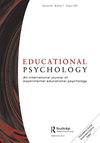Mental toughness in higher education: exploring the roles of flow and feedback
IF 3.6
2区 心理学
Q1 EDUCATION & EDUCATIONAL RESEARCH
引用次数: 1
Abstract
Abstract Previous research has found that mental toughness is a predictor of attainment in higher education, but there is little empirical research investigating the underpinnings of this. Two studies were therefore conducted to explore why mental toughness may be important. In Study 1, 123 undergraduates completed measures of mental toughness, flow, engagement with feedback, and reported their academic attainment. Components of mental toughness, particularly commitment, were related to flow, engagement with feedback, and academic performance. Flow and engagement with feedback were found to be significant mediators of the relationship between the commitment component of mental toughness and academic performance. In Study 2, 79 participants completed a measure of mental toughness and were assigned to high or low mental toughness groups. They then completed two mathematics tasks, and received either positive, negative, or no feedback between the tasks. Those with lower mental toughness were found to perform less well following negative feedback than those with higher mental toughness. The results are discussed in terms of implications for educators who provide feedback and seek to encourage students to engage with that feedback.高等教育中的心理韧性:心流与反馈的作用探讨
先前的研究发现,心理韧性是高等教育成就的预测因子,但很少有实证研究调查这一基础。因此,进行了两项研究来探索为什么心理韧性可能很重要。在研究1中,123名本科生完成了心理韧性、心流、参与反馈的测量,并报告了他们的学业成就。心理韧性的组成部分,特别是承诺,与心流、参与反馈和学习成绩有关。心流和反馈参与是心理韧性承诺成分与学业成绩关系的显著中介。在研究2中,79名参与者完成了一项心理韧性测量,并被分配到高或低心理韧性组。然后,他们完成了两项数学任务,在任务之间分别收到正面、负面或没有反馈。研究发现,心理韧性较低的人在接受负面反馈后的表现不如心理韧性较高的人。这些结果对提供反馈并寻求鼓励学生参与反馈的教育者的影响进行了讨论。
本文章由计算机程序翻译,如有差异,请以英文原文为准。
求助全文
约1分钟内获得全文
求助全文
来源期刊

Educational Psychology
Multiple-
CiteScore
6.40
自引率
6.20%
发文量
57
期刊介绍:
This journal provides an international forum for the discussion and rapid dissemination of research findings in psychology relevant to education. The journal places particular emphasis on the publishing of papers reporting applied research based on experimental and behavioural studies. Reviews of relevant areas of literature also appear from time to time. The aim of the journal is to be a primary source for articles dealing with the psychological aspects of education ranging from pre-school to tertiary provision and the education of children with special needs. The prompt publication of high-quality articles is the journal"s first priority. All contributions are submitted "blind" to at least two independent referees before acceptance for publication.
 求助内容:
求助内容: 应助结果提醒方式:
应助结果提醒方式:


